Unit 5 Do you want to watch a game show Section A课时练(3课时共38张PPT)
文档属性
| 名称 | Unit 5 Do you want to watch a game show Section A课时练(3课时共38张PPT) |  | |
| 格式 | pptx | ||
| 文件大小 | 677.0KB | ||
| 资源类型 | 教案 | ||
| 版本资源 | 人教新目标(Go for it)版 | ||
| 科目 | 英语 | ||
| 更新时间 | 2023-11-17 18:36:40 | ||
图片预览

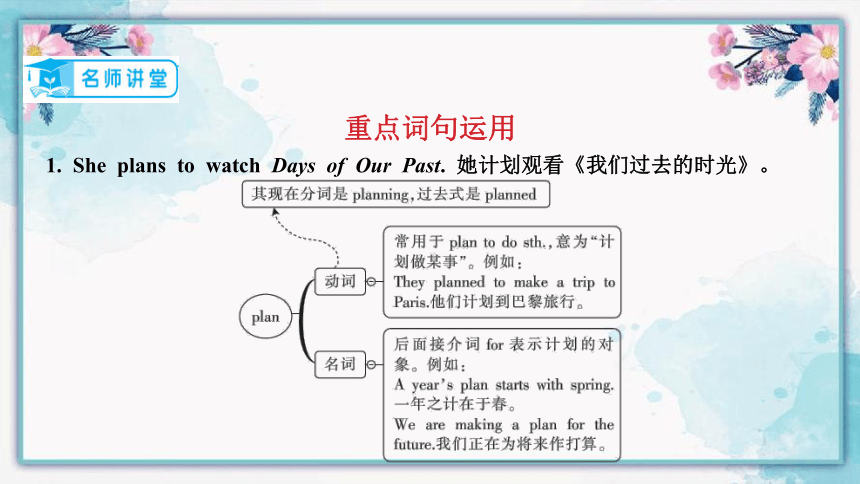
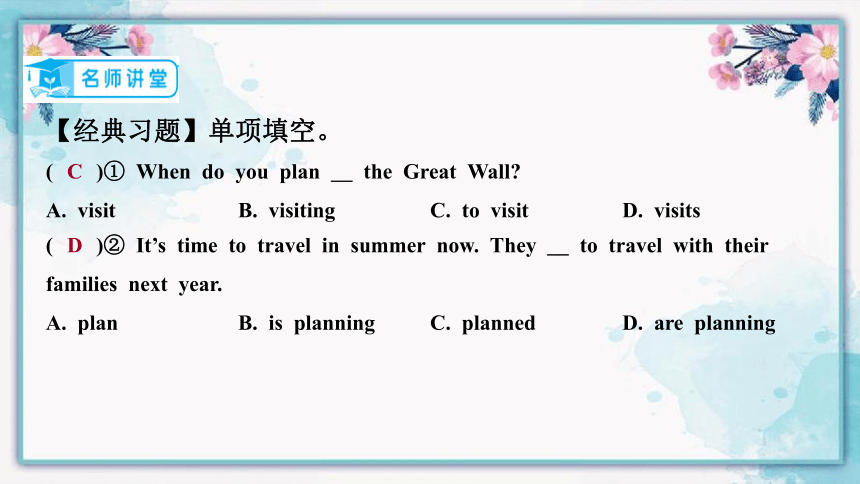

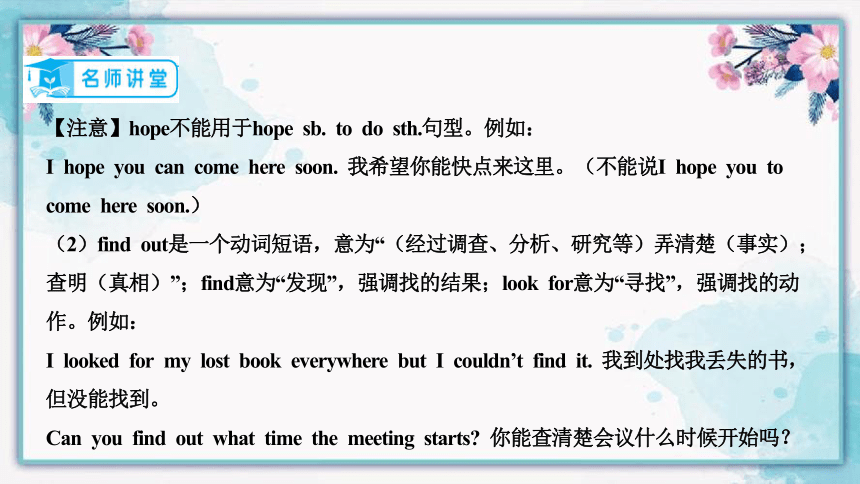
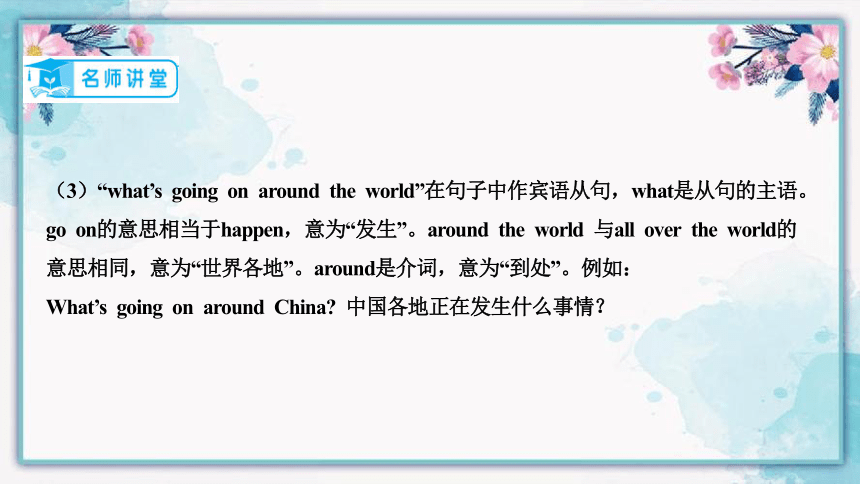

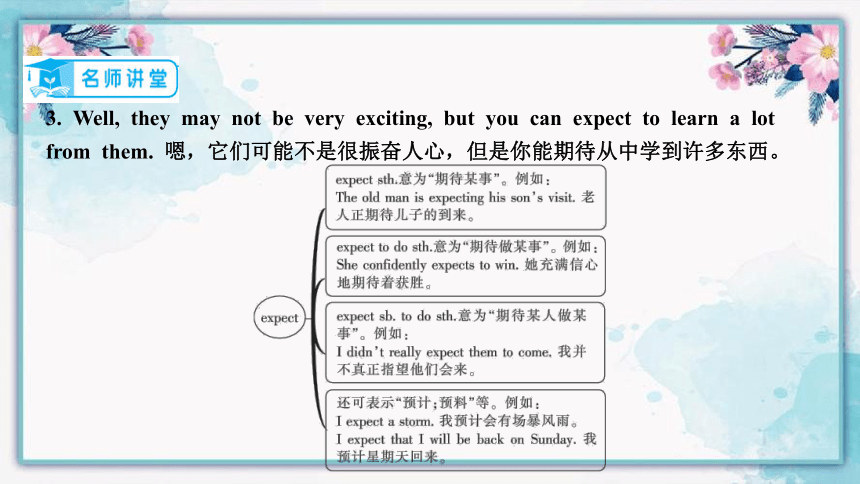
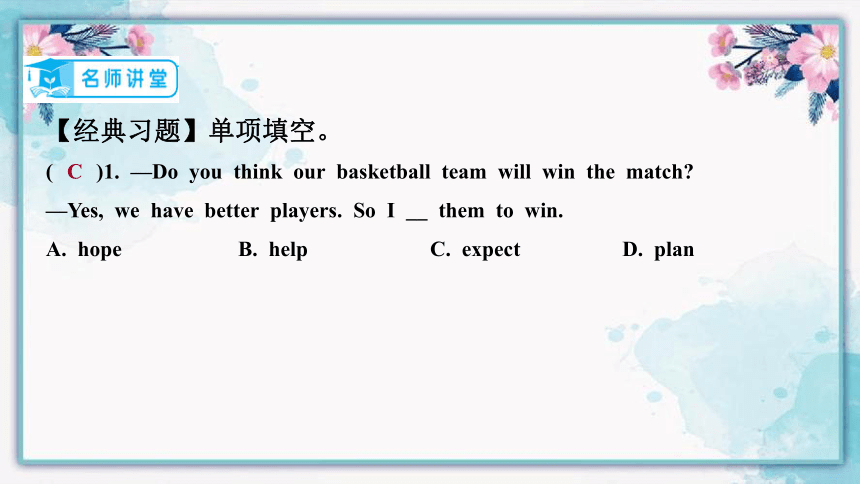
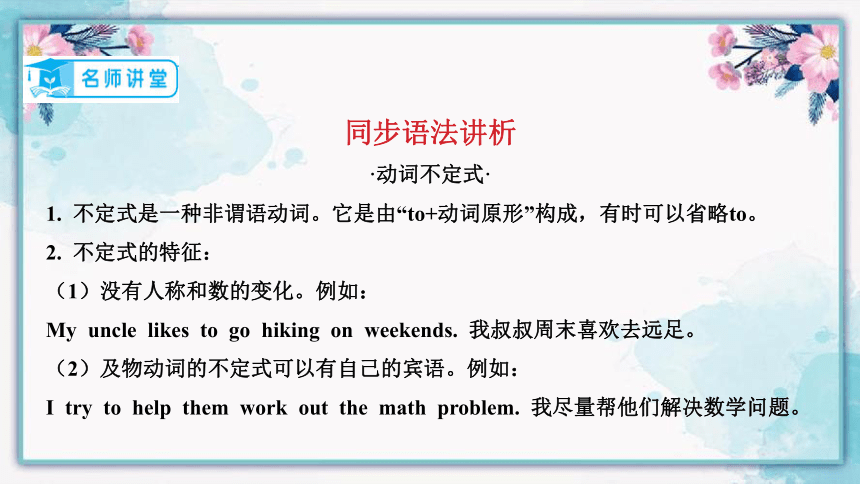


文档简介
(共38张PPT)
Unit 5 Do you want to
watch a game show
Section A
重点词句运用
1. She plans to watch Days of Our Past. 她计划观看《我们过去的时光》。
【经典习题】单项填空。
( )① When do you plan __ the Great Wall
A. visit B. visiting C. to visit D. visits
C
( )② It’s time to travel in summer now. They __ to travel with their families next year.
A. plan B. is planning C. planned D. are planning
D
2. Because I hope to find out what’s going on around the world. 因为我希望弄清楚世界各地正在发生什么事情。
(1)hope作动词时,用法如下:
①hope + that从句(that可省略);
②hope to do sth. 意为“希望做某事”。
如果that从句的主语与主句主语一致,两种结构可互换且意思不变,否则不能互换。例如:
I hope to see you soon.
=I hope (that) I can see you soon. 我希望很快见到你。
【注意】hope不能用于hope sb. to do sth.句型。例如:
I hope you can come here soon. 我希望你能快点来这里。(不能说I hope you to come here soon.)
(2)find out是一个动词短语,意为“(经过调查、分析、研究等)弄清楚(事实);查明(真相)”;find意为“发现”,强调找的结果;look for意为“寻找”,强调找的动作。例如:
I looked for my lost book everywhere but I couldn’t find it. 我到处找我丢失的书,但没能找到。
Can you find out what time the meeting starts 你能查清楚会议什么时候开始吗?
(3)“what’s going on around the world”在句子中作宾语从句,what是从句的主语。go on的意思相当于happen,意为“发生”。around the world 与all over the world的意思相同,意为“世界各地”。around是介词,意为“到处”。例如:
What’s going on around China 中国各地正在发生什么事情?
【经典习题】单项填空。
( )① I like places where the weather is always warm. I hope __ Hainan this winter.
A. visiting B. to visit C. visited D. visits
B
( )② —Can you __ who broke the window of the classroom
—Sorry, I can’t, Mr.Smith.
A. wait for B. ask for C. come out D. find out
D
3. Well, they may not be very exciting, but you can expect to learn a lot from them. 嗯,它们可能不是很振奋人心,但是你能期待从中学到许多东西。
【经典习题】单项填空。
( )1. —Do you think our basketball team will win the match
—Yes, we have better players. So I __ them to win.
A. hope B. help C. expect D. plan
C
同步语法讲析
·动词不定式·
1. 不定式是一种非谓语动词。它是由“to+动词原形”构成,有时可以省略to。
2. 不定式的特征:
(1)没有人称和数的变化。例如:
My uncle likes to go hiking on weekends. 我叔叔周末喜欢去远足。
(2)及物动词的不定式可以有自己的宾语。例如:
I try to help them work out the math problem. 我尽量帮他们解决数学问题。
(3) 可以被状语修饰。例如:
My parents told me to drive the car carefully. 我父母告诫我开车要小心。
(4) 其否定形式是在不定式符号to 前加not。例如:
The policeman told us not to play football on the street. 警察告诫我们不要在马路上踢足球。
3. 不定式的句法功能及用法:不定式在句中起名词、形容词或副词的作用,可作主语、宾语、表语、宾语补足语、定语、状语等。
(1)后常跟动词不定式作宾语的动词有:offer、plan、like、help、hope、decide、learn、wish、want、agree、refuse、begin、start、forget、remember 等。例如:
Mike refused to go boating with us at last. 迈克最终还是拒绝和我们去划船。
My aunt wants to see the film with me tomorrow evening. 我阿姨明晚想和我去看电影。
(2) 在know、decide、remember等动词之后可用“疑问词+动词不定式”作宾语。例如:
I can’t decide which to buy. 我决定不了该买哪个。
(3) 后常跟动词不定式作宾语补足语的动词有:teach、ask、tell、allow、invite、advise、expect等。例如:
My teacher asks us to read English aloud every morning.我的老师要求我们每天早晨大声朗读英语。
We expected him to help us with our task.我们期望他能帮我们完成任务。
(4) 在let、make和have之后用省略to的不定式作宾补。例如:
His parents made him think for himself. 他的父母让他自己独立思考。
(5) 作状语时,动词不定式表示目的。例如:
They choose to use their own bags to save the environment. 他们选择使用自己的袋子,是为了保护环境。
(6) 作定语时,不定式常置于被修饰的名词或代词之后。例如:
She was the first one to get to the top of the mountain. 她是第一个到达山顶的人。
4. 下列动词后面既可跟不定式,也可跟动词-ing形式作宾语,但意义明显不同:
例如:
Don’t forget to buy some food for me. 不要忘了给我买点食物。
I couldn’t forget meeting all of you for the first time last year. 我忘不了去年第一次遇见你们所有人时的情景。
【语法专练】
一、用括号中所给单词的正确形式填空。
1. Our teacher usually tells us ______________(spend) too much time on computer games.
not to spend
2. We need __________(make) more young people learn Shadow Play so that it won’t disappear in China.
to make
3. When I travel, I always carry a camera _________(take) photos.
to take
二、单项填空。
( )1. They stopped __ but there was not any sound around them.
A. to listen B. listens C. listen D. listening
A
( )2. Do you enjoy __ a volunteer? If you want __ this, you’d better join us.
A. being; knowing B. to be; knowing C. being; to know D. to be; to know
C
( )3. TaiChi is my grandfather’s favorite and he often plays it __ healthy.
A. keeps B. keeping C. kept D. to keep
D
第1课时(1a~1c)
一、从方框中选择合适的单词,并用其适当形式填空(每个词限用一次)。
opera mind talent
news stand sitcom
1. I can’t ________ the TV show. It is very boring.
stand
2. —How did you know the _______?
—I read it on the newspaper .
news
3. —How about talk shows?
—They are OK. I don’t _______ them.
mind
operas
4. Jack really likes soap _________. He watches them every day.
Sitcoms
5. __________, or situation comedies, are Helen’s favorite TV shows.
6. It’s always interesting to watch other people show their talents, so ________ shows are getting more and more popular.
talent
二、从方框中选择合适的句子补全对话。其中有两个多余选项。
A: Bill, do you like watching TV shows
B: 1.__ I watch them every night.
A: Do you like watching sports shows
B: Yes, I love them a lot. 2.__
A: You’re right. I like them, too. How about soap operas
B: 3.__
A: And sitcoms
C
A
D
B: 4.__
A: Oh, I don’t like sitcoms, either. What do you think of the news
B: The news I like it very much. 5.__
A. They are really wonderful.
B. In fact, I like the news best.
C. Yes, I do.
D. I don’t mind soap operas and I don’t often watch them.
E. Well, I don’t like them. They’re boring.
F. No, I don’t.
G. I like to watch talk shows.
E
B
三、用括号内所给单词的适当形式填空。
1. I can’t stand ________(eat) such a pear like that.
eating
2. Do you mind __________(open) the box for me?
opening
3. Students enjoy ___________(watch) game shows very much.
watching
4. —What about sports shows?
—Oh, it’s __________(excite).
exciting
5. Could you please _______(help) me with my English?
help
6. Let’s ________(watch) a talk show.
watch
第2课时(2a~2d)
一、单项填空。
( )1. —What do you think of the TV show
—It’s very __. Many children like watching it.
A. boring B. funny C. surprising D. terrible
B
( )2. —Jack, could you please help me __ when the plane to Fuzhou takes off on Friday?
—Sure! Let me search(搜索) it on the Internet.
A. get out B. find out C. look out D. take out
B
( )3. I like sitcoms because I can __ a lot __ them.
A. study; for B. learn; for C. study; from D. learn; from
D
( )4. I began watching here an hour ago, but nothing __ yet.
A. happen B. happens C. happened D. happening
C
( )5. —What did you do __ class today, Alice
—We had a discussion __ TV shows.
A. in; about
B. on; about
C. in; of
D. from; on
A
二、从方框中选择合适的句子补全对话。其中有两个多余选项。
A: Good morning, Judy.
B: Good morning, Kate. 1.__
A: I watch TV.
B: 2.__
A: I like watching the news. I watch it every night.
B: 3.__ I never watch it. Why do you like watching it
A: Because I hope to find out what’s going on around the world.
B
D
E
B: 4.__
A: Talk shows are OK. I don’t mind them.
B: 5.__
A: Yes, I like them. They’re interesting. I can learn some great jokes from sitcoms.
B: Oh, it’s interesting to watch TV. I’ll try. Bye.
A: Bye.
C
G
A. I think the news is funny.
B. What do you do every night
C. What do you think of talk shows
D. What program do you like watching on TV
E. I think the news is boring.
F. When do you watch TV
G. Do you like watching sitcoms
三、完形填空。
Mike and Alan are my best friends. We are in the same 1 . Mike is
2 , so he sits in the front of the classroom. Mike likes 3 . He can play the guitar and the drums, but his favorite thing is 4 . He likes Animal World and Sports News very much. He thinks they’re very interesting. Mike
5 watches soap operas. He thinks they’re boring. Oh, I have the same idea 6 he does. I also think 7 are very boring.
Alan likes collecting 8 . You can always see lots of things in his
schoolbag. Yesterday he 9 Mike and me two things. Oh, he also asked us what we 10 them. Mike liked the key ring and the wallet. Er, I didn’t like them. I thought they were for girls.
( )1. A. family B. class C. office D. shop
B
( )2. A. thin B. tall C. heavy D. short
D
( )3. A. music B. sports C. English D. cooking
A
( )4. A. reading books B. watching TV
C. going shopping D. playing games
B
( )5. A. always B. often C. never D. only
C
( )6. A. with B. of C. for D. as
D
( )7. A. it B. that C. they D. we
C
( )8. A. words B. things C. wallets D. TVs
B
( )9. A. enjoyed B. wanted C. showed D. made
C
( )10. A. thought of B. looked at C. talked about D. studied for
A
第3课时(Grammar Focus~3c)
一、从Ⅱ栏中选出与Ⅰ栏中的问句相对应的答语。
Ⅱ
A. Because they’re very relaxing.
B. Yes, we do.
C. At eight every night.
D. We played soccer.
E. Twice a week.
F. Animal World.
G. I can’t stand them.
H. Sam.
( )1. What did you do after class today
D
( )2. Why do you like soap operas
A
( )3. Do you plan to go there tomorrow
B
( )4. When do you watch the news
C
( )5. How often do you watch TV
E
( )6. What’s your favorite TV show
F
( )7. How do you like game shows
G
( )8. Who never wants to watch a game show
H
Ⅰ
二、单项填空。
( )1. —How do you like the new book
—__.
A. Very rich B. Very delicious
C. Very interesting D. Very much
C
( )2. The driver wanted __ his car near the roadside but the police asked him not to.
A. park B. parked C. parking D. to park
D
( )3. I __ you can get good grades in the exam.
A. like B. hope C. want D. plan
B
( )4. At the beginning, all the people expected Tom __ the important exam, but he failed at last.
A. passing B. to pass C. passed D. pass
B
( )5. The TV show is very __. Let’s go out for a walk.
A. exciting B. enjoyable C. educational D. boring
D
( )6. I’m happy to be here __ you English.
A. to teach B. teach C. teaching D. taught
A
三、完形填空。
Watching TV is a popular way to relax. More and more people 1 in their free time. There are many 2 kinds of TV shows. What kind of TV show do you like I 3 my family and some of my friends about this question.
My 4 likes watching soap operas. She thinks they’re 5 . She loves to watch them after 6 . She watches them at 8:00 every night. My father likes 7 news. He says he can’t stand soap operas 8 they’re
boring. My little brother likes sitcoms. They are always funny. They make children laugh.
As for middle school students, they like TV shows very much. 9 like talent shows. But boys like game shows, and they love talk shows.
In my opinion, different people like different shows. It’s just like different people have 10 own hobbies.
( )1. A. play games B. read news C. watch TV D. listen to music
C
( )2. A. different B. good C. interesting D. funny
A
( )3. A. told B. wanted C. gave D. asked
D
( )4. A. father B. friend C. mother D. brother
C
( )5. A. boring B. terrible C. relaxing D. easy
C
( )6. A. breakfast B. lunch C. class D. dinner
D
( )7. A. learning B. watching C. reading D. writing
B
( )8. A. and B. so C. but D. because
D
( )9. A. Children B. Girls C. Boys D. Parents
B
( )10. A. their B. my C. his D. her
A
Unit 5 Do you want to
watch a game show
Section A
重点词句运用
1. She plans to watch Days of Our Past. 她计划观看《我们过去的时光》。
【经典习题】单项填空。
( )① When do you plan __ the Great Wall
A. visit B. visiting C. to visit D. visits
C
( )② It’s time to travel in summer now. They __ to travel with their families next year.
A. plan B. is planning C. planned D. are planning
D
2. Because I hope to find out what’s going on around the world. 因为我希望弄清楚世界各地正在发生什么事情。
(1)hope作动词时,用法如下:
①hope + that从句(that可省略);
②hope to do sth. 意为“希望做某事”。
如果that从句的主语与主句主语一致,两种结构可互换且意思不变,否则不能互换。例如:
I hope to see you soon.
=I hope (that) I can see you soon. 我希望很快见到你。
【注意】hope不能用于hope sb. to do sth.句型。例如:
I hope you can come here soon. 我希望你能快点来这里。(不能说I hope you to come here soon.)
(2)find out是一个动词短语,意为“(经过调查、分析、研究等)弄清楚(事实);查明(真相)”;find意为“发现”,强调找的结果;look for意为“寻找”,强调找的动作。例如:
I looked for my lost book everywhere but I couldn’t find it. 我到处找我丢失的书,但没能找到。
Can you find out what time the meeting starts 你能查清楚会议什么时候开始吗?
(3)“what’s going on around the world”在句子中作宾语从句,what是从句的主语。go on的意思相当于happen,意为“发生”。around the world 与all over the world的意思相同,意为“世界各地”。around是介词,意为“到处”。例如:
What’s going on around China 中国各地正在发生什么事情?
【经典习题】单项填空。
( )① I like places where the weather is always warm. I hope __ Hainan this winter.
A. visiting B. to visit C. visited D. visits
B
( )② —Can you __ who broke the window of the classroom
—Sorry, I can’t, Mr.Smith.
A. wait for B. ask for C. come out D. find out
D
3. Well, they may not be very exciting, but you can expect to learn a lot from them. 嗯,它们可能不是很振奋人心,但是你能期待从中学到许多东西。
【经典习题】单项填空。
( )1. —Do you think our basketball team will win the match
—Yes, we have better players. So I __ them to win.
A. hope B. help C. expect D. plan
C
同步语法讲析
·动词不定式·
1. 不定式是一种非谓语动词。它是由“to+动词原形”构成,有时可以省略to。
2. 不定式的特征:
(1)没有人称和数的变化。例如:
My uncle likes to go hiking on weekends. 我叔叔周末喜欢去远足。
(2)及物动词的不定式可以有自己的宾语。例如:
I try to help them work out the math problem. 我尽量帮他们解决数学问题。
(3) 可以被状语修饰。例如:
My parents told me to drive the car carefully. 我父母告诫我开车要小心。
(4) 其否定形式是在不定式符号to 前加not。例如:
The policeman told us not to play football on the street. 警察告诫我们不要在马路上踢足球。
3. 不定式的句法功能及用法:不定式在句中起名词、形容词或副词的作用,可作主语、宾语、表语、宾语补足语、定语、状语等。
(1)后常跟动词不定式作宾语的动词有:offer、plan、like、help、hope、decide、learn、wish、want、agree、refuse、begin、start、forget、remember 等。例如:
Mike refused to go boating with us at last. 迈克最终还是拒绝和我们去划船。
My aunt wants to see the film with me tomorrow evening. 我阿姨明晚想和我去看电影。
(2) 在know、decide、remember等动词之后可用“疑问词+动词不定式”作宾语。例如:
I can’t decide which to buy. 我决定不了该买哪个。
(3) 后常跟动词不定式作宾语补足语的动词有:teach、ask、tell、allow、invite、advise、expect等。例如:
My teacher asks us to read English aloud every morning.我的老师要求我们每天早晨大声朗读英语。
We expected him to help us with our task.我们期望他能帮我们完成任务。
(4) 在let、make和have之后用省略to的不定式作宾补。例如:
His parents made him think for himself. 他的父母让他自己独立思考。
(5) 作状语时,动词不定式表示目的。例如:
They choose to use their own bags to save the environment. 他们选择使用自己的袋子,是为了保护环境。
(6) 作定语时,不定式常置于被修饰的名词或代词之后。例如:
She was the first one to get to the top of the mountain. 她是第一个到达山顶的人。
4. 下列动词后面既可跟不定式,也可跟动词-ing形式作宾语,但意义明显不同:
例如:
Don’t forget to buy some food for me. 不要忘了给我买点食物。
I couldn’t forget meeting all of you for the first time last year. 我忘不了去年第一次遇见你们所有人时的情景。
【语法专练】
一、用括号中所给单词的正确形式填空。
1. Our teacher usually tells us ______________(spend) too much time on computer games.
not to spend
2. We need __________(make) more young people learn Shadow Play so that it won’t disappear in China.
to make
3. When I travel, I always carry a camera _________(take) photos.
to take
二、单项填空。
( )1. They stopped __ but there was not any sound around them.
A. to listen B. listens C. listen D. listening
A
( )2. Do you enjoy __ a volunteer? If you want __ this, you’d better join us.
A. being; knowing B. to be; knowing C. being; to know D. to be; to know
C
( )3. TaiChi is my grandfather’s favorite and he often plays it __ healthy.
A. keeps B. keeping C. kept D. to keep
D
第1课时(1a~1c)
一、从方框中选择合适的单词,并用其适当形式填空(每个词限用一次)。
opera mind talent
news stand sitcom
1. I can’t ________ the TV show. It is very boring.
stand
2. —How did you know the _______?
—I read it on the newspaper .
news
3. —How about talk shows?
—They are OK. I don’t _______ them.
mind
operas
4. Jack really likes soap _________. He watches them every day.
Sitcoms
5. __________, or situation comedies, are Helen’s favorite TV shows.
6. It’s always interesting to watch other people show their talents, so ________ shows are getting more and more popular.
talent
二、从方框中选择合适的句子补全对话。其中有两个多余选项。
A: Bill, do you like watching TV shows
B: 1.__ I watch them every night.
A: Do you like watching sports shows
B: Yes, I love them a lot. 2.__
A: You’re right. I like them, too. How about soap operas
B: 3.__
A: And sitcoms
C
A
D
B: 4.__
A: Oh, I don’t like sitcoms, either. What do you think of the news
B: The news I like it very much. 5.__
A. They are really wonderful.
B. In fact, I like the news best.
C. Yes, I do.
D. I don’t mind soap operas and I don’t often watch them.
E. Well, I don’t like them. They’re boring.
F. No, I don’t.
G. I like to watch talk shows.
E
B
三、用括号内所给单词的适当形式填空。
1. I can’t stand ________(eat) such a pear like that.
eating
2. Do you mind __________(open) the box for me?
opening
3. Students enjoy ___________(watch) game shows very much.
watching
4. —What about sports shows?
—Oh, it’s __________(excite).
exciting
5. Could you please _______(help) me with my English?
help
6. Let’s ________(watch) a talk show.
watch
第2课时(2a~2d)
一、单项填空。
( )1. —What do you think of the TV show
—It’s very __. Many children like watching it.
A. boring B. funny C. surprising D. terrible
B
( )2. —Jack, could you please help me __ when the plane to Fuzhou takes off on Friday?
—Sure! Let me search(搜索) it on the Internet.
A. get out B. find out C. look out D. take out
B
( )3. I like sitcoms because I can __ a lot __ them.
A. study; for B. learn; for C. study; from D. learn; from
D
( )4. I began watching here an hour ago, but nothing __ yet.
A. happen B. happens C. happened D. happening
C
( )5. —What did you do __ class today, Alice
—We had a discussion __ TV shows.
A. in; about
B. on; about
C. in; of
D. from; on
A
二、从方框中选择合适的句子补全对话。其中有两个多余选项。
A: Good morning, Judy.
B: Good morning, Kate. 1.__
A: I watch TV.
B: 2.__
A: I like watching the news. I watch it every night.
B: 3.__ I never watch it. Why do you like watching it
A: Because I hope to find out what’s going on around the world.
B
D
E
B: 4.__
A: Talk shows are OK. I don’t mind them.
B: 5.__
A: Yes, I like them. They’re interesting. I can learn some great jokes from sitcoms.
B: Oh, it’s interesting to watch TV. I’ll try. Bye.
A: Bye.
C
G
A. I think the news is funny.
B. What do you do every night
C. What do you think of talk shows
D. What program do you like watching on TV
E. I think the news is boring.
F. When do you watch TV
G. Do you like watching sitcoms
三、完形填空。
Mike and Alan are my best friends. We are in the same 1 . Mike is
2 , so he sits in the front of the classroom. Mike likes 3 . He can play the guitar and the drums, but his favorite thing is 4 . He likes Animal World and Sports News very much. He thinks they’re very interesting. Mike
5 watches soap operas. He thinks they’re boring. Oh, I have the same idea 6 he does. I also think 7 are very boring.
Alan likes collecting 8 . You can always see lots of things in his
schoolbag. Yesterday he 9 Mike and me two things. Oh, he also asked us what we 10 them. Mike liked the key ring and the wallet. Er, I didn’t like them. I thought they were for girls.
( )1. A. family B. class C. office D. shop
B
( )2. A. thin B. tall C. heavy D. short
D
( )3. A. music B. sports C. English D. cooking
A
( )4. A. reading books B. watching TV
C. going shopping D. playing games
B
( )5. A. always B. often C. never D. only
C
( )6. A. with B. of C. for D. as
D
( )7. A. it B. that C. they D. we
C
( )8. A. words B. things C. wallets D. TVs
B
( )9. A. enjoyed B. wanted C. showed D. made
C
( )10. A. thought of B. looked at C. talked about D. studied for
A
第3课时(Grammar Focus~3c)
一、从Ⅱ栏中选出与Ⅰ栏中的问句相对应的答语。
Ⅱ
A. Because they’re very relaxing.
B. Yes, we do.
C. At eight every night.
D. We played soccer.
E. Twice a week.
F. Animal World.
G. I can’t stand them.
H. Sam.
( )1. What did you do after class today
D
( )2. Why do you like soap operas
A
( )3. Do you plan to go there tomorrow
B
( )4. When do you watch the news
C
( )5. How often do you watch TV
E
( )6. What’s your favorite TV show
F
( )7. How do you like game shows
G
( )8. Who never wants to watch a game show
H
Ⅰ
二、单项填空。
( )1. —How do you like the new book
—__.
A. Very rich B. Very delicious
C. Very interesting D. Very much
C
( )2. The driver wanted __ his car near the roadside but the police asked him not to.
A. park B. parked C. parking D. to park
D
( )3. I __ you can get good grades in the exam.
A. like B. hope C. want D. plan
B
( )4. At the beginning, all the people expected Tom __ the important exam, but he failed at last.
A. passing B. to pass C. passed D. pass
B
( )5. The TV show is very __. Let’s go out for a walk.
A. exciting B. enjoyable C. educational D. boring
D
( )6. I’m happy to be here __ you English.
A. to teach B. teach C. teaching D. taught
A
三、完形填空。
Watching TV is a popular way to relax. More and more people 1 in their free time. There are many 2 kinds of TV shows. What kind of TV show do you like I 3 my family and some of my friends about this question.
My 4 likes watching soap operas. She thinks they’re 5 . She loves to watch them after 6 . She watches them at 8:00 every night. My father likes 7 news. He says he can’t stand soap operas 8 they’re
boring. My little brother likes sitcoms. They are always funny. They make children laugh.
As for middle school students, they like TV shows very much. 9 like talent shows. But boys like game shows, and they love talk shows.
In my opinion, different people like different shows. It’s just like different people have 10 own hobbies.
( )1. A. play games B. read news C. watch TV D. listen to music
C
( )2. A. different B. good C. interesting D. funny
A
( )3. A. told B. wanted C. gave D. asked
D
( )4. A. father B. friend C. mother D. brother
C
( )5. A. boring B. terrible C. relaxing D. easy
C
( )6. A. breakfast B. lunch C. class D. dinner
D
( )7. A. learning B. watching C. reading D. writing
B
( )8. A. and B. so C. but D. because
D
( )9. A. Children B. Girls C. Boys D. Parents
B
( )10. A. their B. my C. his D. her
A
同课章节目录
- Unit 1 Where did you go on vacation?
- Section A
- Section B
- Unit 2 How often do you exercise?
- Section A
- Section B
- Unit 3 I'm more outgoing than my sister.
- Section A
- Section B
- Unit 4 What's the best movie theater?
- Section A
- Section B
- Unit 5 Do you want to watch a game show?
- Section A
- Section B
- Unit 6 I'm going to study computer science.
- Section A
- Section B
- Unit 7 Will people have robots?
- Section A
- Section B
- Unit 8 How do you make a banana milk shake?
- Section A
- Section B
- Unit 9 Can you come to my party?
- Section A
- Section B
- Unit 10 If you go to the party, you'll have a grea
- Section A
- Section B
